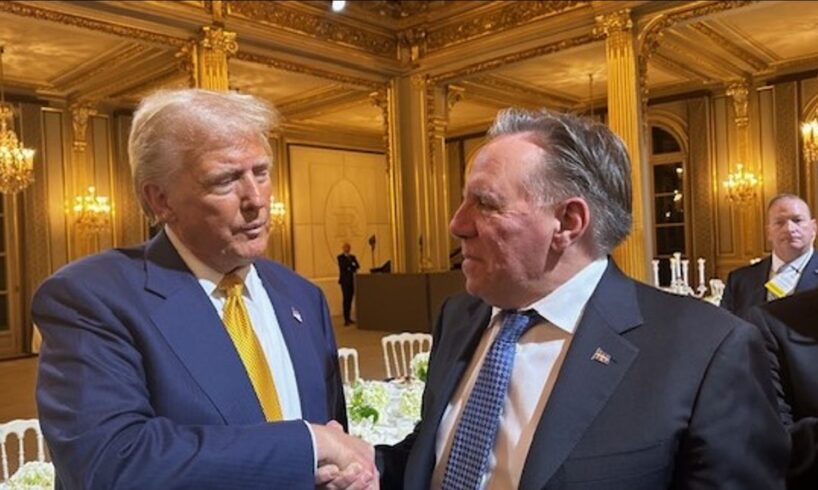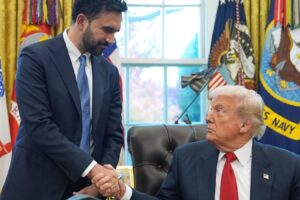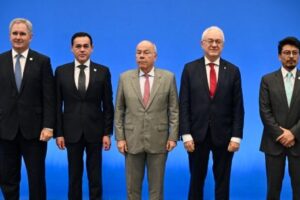
Quebec Premier François Legault and his Coalition Avenir Québec (CAQ) government are aggressively moving forward with the economic “shock therapy” that the premier pledged when shuffling his cabinet in September.
Key elements in the government’s class war agenda include: slashing and privatizing public services; gutting environmental regulations; continued attacks on immigrants and religious minorities aimed at scapegoating them for the social crisis produced by capitalism; and further coercive measures to suppress working-class opposition.
Trump and Quebec Premier François Legault [Photo: X/Legault]
Legault’s “shock therapy” marks a further lurch to the far-right of his Quebec First “national-autonomist” government, at a time when it is hemorrhaging popular support. Opinion polls indicate that the pro-independence Parti Québécois (PQ) is poised to win the provincial election slated for next October, with the CAQ finishing at best a distant third. Fearing an electoral wipeout, some CAQ legislators, including former ministers, have publicly called for the resignation of Legault, the party’s founder and sole ever leader.
With his anti-working class offensive, Legault is desperately seeking to rally the support of the ruling class by demonstrating that the avowedly conservative and pro-big business CAQ is the best vehicle in Quebec provincial politics for advancing its agenda of austerity, increased worker-exploitation, rearmament and imperialist war.
At the opening of the Quebec National Assembly’s fall session last month, Legault outlined four priorities for the final year of his government’s mandate: economy, efficiency, security, and identity. In plain terms, this means augmenting corporate profits, dismantling public services and social supports, suppressing mounting social opposition, and inciting Quebec chauvinism.
In his October 1 speech, Legault praised Prime Minister Mark Carney’s federal Liberal government for its 17% increase in military spending in the 2025-26 fiscal year and its pledge to hike Canada’s military and defence-related spending to 5% of GDP or more than $150 billion per year by 2035. Legault lauded this as a major “growth opportunity” for Quebec, and announced changes to the rules governing Investissement Québec—an agency under the Ministry of Economy, Innovation and Energy—so as to allow it to disregard ethical considerations and invest public funds in the arms industry.
Over the past two years, the Quebec government has lost some $2 billion due to investments in the EV (electric vehicle) and battery industry that went belly up. Nevertheless, Legault signaled his intent to continue offering billions in public grants and forgivable loans to large corporations, including henceforth weapons manufacturers.
Quebec’s premier also announced that his government will fast-track a bill to accelerate big business infrastructure projects. Like the Building Canada Act which the Carney government adopted last June, this measure will exempt major projects and the companies that build them from normal regulatory oversight and rules—especially in respect to the environment—in order to maximize profits.
To make the working class pay for these and other corporate giveaways, the CAQ will introduce a “bureaucracy reduction” bill that will pave the way for abolishing “superfluous” public agencies, massive social spending cuts, and the elimination of thousands of public service jobs.
Legault also vowed to reduce doctor’s pay, in a demagogic attempt to blame doctors for the health care crisis produced by the decades of austerity imposed by all the federal and provincial parties, and in particular Quebec’s acute family-doctor shortage. Currently, more than a quarter of all Quebeckers do not have access to a family doctor.
In late October, the CAQ government made good on Legault’s vow. It used closure to ram through a draconian law (Bill 2) that changed the province’s pay structure for doctors, including through the introduction of “efficiency” quotas, and threatens massive fines for any doctors who resist whether through collective action or by moving to another province.
The government’s “shock therapy” will compound the impact of the billions of dollars in budget cuts announced in last spring’s Quebec budget—cuts that have already led to thousands of job losses in health care and education, and other essential services such as road maintenance, and drinking-water monitoring.
It is an integral part of the drive of Canada’s ruling class—spearheaded by the former central banker and blue-chip executive Carney and his federal Liberal government—to use the barrage of tariffs and annexation threats made by America’s would-be dictator president Donald Trump as political cover for a massive intensification of the assault on the working class.
To deflect attention from the consequences of its policies and divide working people, the CAQ government has stepped up its chauvinist incitement against immigrants and religious minorities.
In his October 1 speech, Legault railed against “Ottawa’s uncontrolled immigration” and the “radical Islamists” who supposedly threaten “the French language, our common values, our culture.”
Legault has declared that his government will have “no choice but to be less generous” toward immigrants—a stance confirmed by a leaked memo from Immigration Minister Jean-François Roberge proposing harsh cuts to services for asylum seekers, including social assistance (welfare).
The premier also announced the government will be introducing a bill to ban public prayer and expand “secularism.” Quebec governments have repeatedly cynically labelled as affirmations of “state secularism” anti-democratic measures that target Muslims and other religious groups, while protecting, in the name of upholding “Quebec’s heritage,” the exalted position of the Roman Catholic Church.
Media reports indicate the government is considering a sweeping ban on “face coverings” in public spaces, including streets and parks. This discriminatory measure would violate fundamental rights and target not only the small minority of Muslim women who wear the hiqab, but also protesters who mask themselves to avoid police reprisals.
Aware of the unpopularity of his socio-economic agenda, Legault has also begun implementing authoritarian measures that explicitly target opposition, above all from the working class.
In his October 1 speech, he claimed there was a growing “sense of insecurity” in Quebec and tasked his Minister of Public Security, former high-level police officer Ian Lafrenière, with implementing a “law and order” program. Social problems such as homelessness and drug use, would be met, he said, with “severe justice” and “repression.”
Police in riot-gear provocatively walked through a demonstration in Montreal on October 7, protesting Israel’s ongoing imperialist-backed genocide in Gaza.
In recent weeks, authorities have deployed riot police to intimidate peaceful demonstrators protesting Israel’s genocide of the Gaza Palestinians and last September’s police killing of 15-year-old Nooran Rezayi in Longueuil.
Meanwhile, the CAQ is moving to silence internal dissent. Legault has announced plans to dismiss senior officials in the province’s health and education system who publicly disclose the devastating impacts of its budget cuts.
The nationalist, draft Quebec Constitution Justice Minister Simon Jolin-Barrette unveiled with much fanfare last month would prohibit public bodies and municipalities from challenging provincial laws in court.
Declaring that “Quebec is the champion of strikes,” Legault is also moving to “modernize” the laws governing trade unions—in effect, eviscerating what remains of workers’ rights. With barely a whimper of protest from the trade union bureaucracy, the government adopted legislation last spring (Bill 89) that dramatically expands the number and range of workers subject to “essential service” prohibitions on the right to strike, and empowers the labour minister to unilaterally order the end to any strike and impose binding arbitration.
Now the government has introduced a further bill that subjects strike and contract-ratification votes to greater state regulation, and would ban unions from spending any money on political campaigns or legal challenges unless expressly authorized in a membership vote.
Supported by the PQ and the Journal de Montreal, the government has spent much of the past year pillorying the Fédération autonome des enseignants (Autonomous Teachers Federation) for joining a court challenge to Bill21, a discriminatory law that bans public school teachers from wearing the hijab and other religious symbols on the reactionary grounds that unions should limit themselves exclusively to “bread-and-butter” contractual issues.
The ostensible opposition parties have mounted only the most nominal resistance to Legault’s “shock therapy.”
The Parti Québécois—a separatist and ultranationalist party that in recent years has set the tone for Quebec establishment politics with its far-right, anti-immigrant agitation and push for the strengthening of the province’s discriminatory language laws—has attacked the CAQ from the right. It is demanding steeper budget cuts and harsher chauvinist measures, including a prohibition on elementary school children wearing religious symbols.
Québec Solidaire (QS), a party rooted in the affluent middle class that self-identifies as “left-wing,” makes timid criticisms of the Legault government, while supporting the union bureaucracy’s suppression of the class struggle and providing political cover for the PQ.
A the beginning of the fall legislative session, just before Legault’s speech, QS and PQ members joined together in a nationalist stunt, walking out of the National Assembly’s Red Room during the Lieutenant Governor’s address, in protest of Quebec’s “archaic ties” to the British monarchy.
This maneuver is part of QS’s ongoing effort to obscure the PQ’s virulent anti-immigrant chauvinism by insisting the party “is not racist,” and that its chauvinist incitement can in no way be compared with the actions of Trump, LePen, Meloni, and other fascists In doing so, QS is aiding the attempt of sections of the ruling class to revive the PQ and launch a new push for the creation of an independent capitalist Quebec.
Because Legault’s union “modernization” bill impinges on the privileges of the union bureaucracy—particularly by restricting the use of workers’ dues—their response to it has been more vocal, at least superficially.
The union leaders’ denunciations of Legault for declaring “war” on Quebec workers are a sham. They are aimed at controlling an increasingly restless rank and file, and persuading the government and ruling class not to rewrite the rules of their anti-worker corporatist partnership. The union bureaucrats remain committed to preserving their alliance with the state and big business. For decades, the union apparatuses, from the Quebec Federation of Labour (FTQ) and Confederation of National Trade Unions (CSN) to Unifor, have suppressed the class struggle in the name of “social peace,” functioning as an arm of corporate management and the state in imposing contact concessions, job cuts and austerity, in exchange for material perks for a small cadre of bureaucrats.
The CSN has launched a campaign under the nationalist slogan “Standing together for Quebec,” aimed at keeping workers’ political horizons limited to Quebec and futile efforts to push the political establishment to the left. For decades, the union bureaucrats in Quebec and across Canada have promoted reactionary Quebec and Canadian nationalism, while systematically dividing the working class within Canada, and from the struggles of their class brothers and sisters in the US and beyond.
While denouncing Legault’s attacks on unions and lamenting the underfunding of public services, the CSN meekly pleads with the various establishment parties to “commit to withdrawing laws and bills that attack workers.”
In doing so, it opens the door to supporting the PQ, whether tacitly or explicitly in the coming provincial election. Although relations somewhat frayed after 2014 due to the PQ’s political marginalization, for most of the past half-century the union bureaucracy has enjoyed close ties to the big business PQ and continued to serve as a key pillar of support even as it came into open conflict with the working class, imposing austerity and anti-strike laws.
FTQ President Magali Picard revealed last spring that she has already held talks with the PQ about a potential electoral endorsement.
The CAQ’s class war offensive and the Quebec ruling elite’s promotion of chauvinist reaction are rooted in a systemic crisis of global capitalism and are paralleled by like developments in all the imperialist countries. To oppose them, Quebec workers must reject all forms of nationalism and launch a counteroffensive against capitalist austerity and war—defending democratic rights and public services and fighting for social equality in solidarity with their class brothers and sisters across Canada and around the world.
Sign up for the WSWS email newsletter





